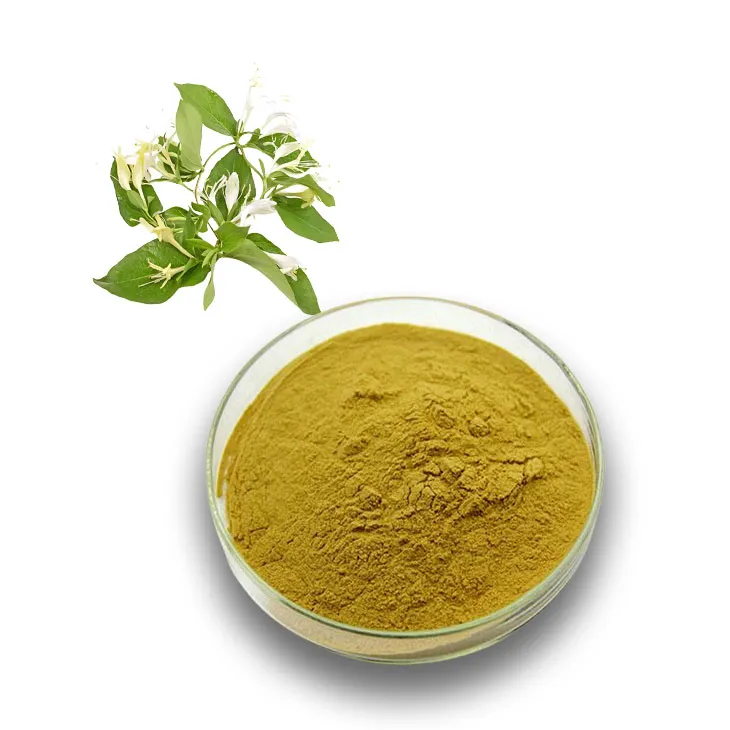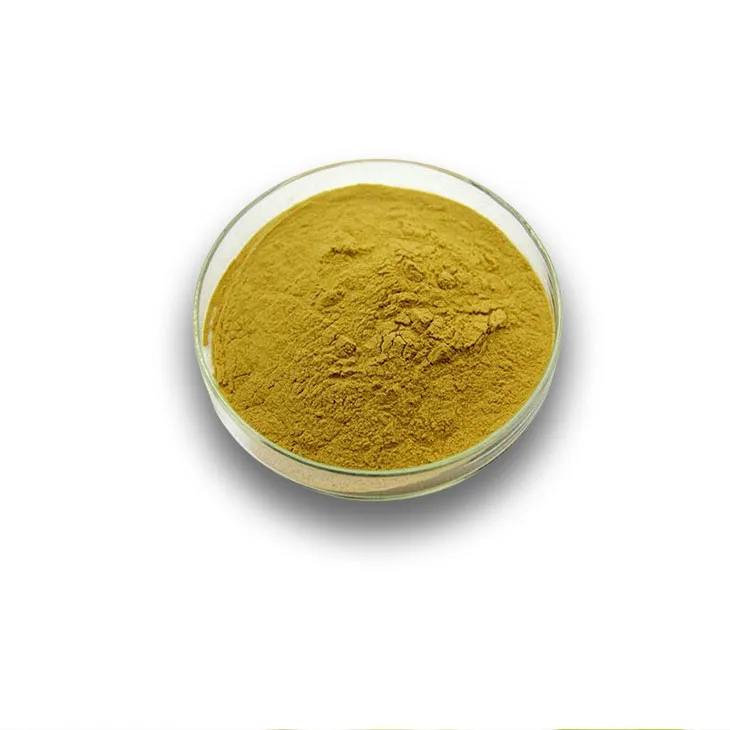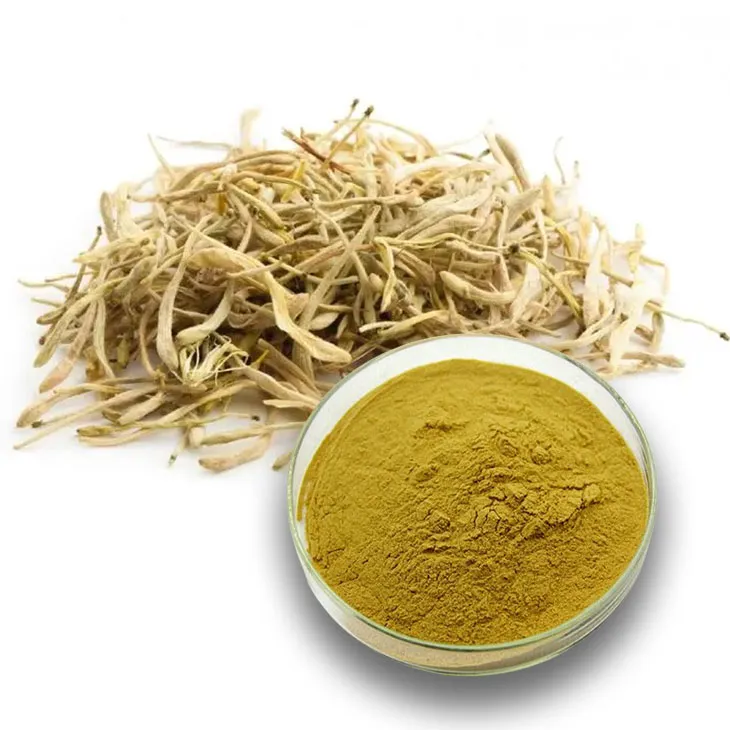- 0086-571-85302990
- sales@greenskybio.com
The benefits of honeysuckle pollen in cattle feed.
2024-11-13

Introduction
In the world of cattle farming, the quality of feed plays a crucial role in the overall health, productivity, and well - being of the animals. One component that has been gaining attention recently is Honeysuckle Pollen. Honeysuckle Pollen has the potential to offer a variety of benefits when incorporated into cattle feed, which can have far - reaching implications for the cattle industry.

Nutritional Composition of Honeysuckle Pollen
Honeysuckle pollen is rich in a diverse range of nutrients. It contains essential amino acids, which are the building blocks of proteins. These amino acids are necessary for the growth and development of cattle, as they are involved in muscle building, enzyme production, and other physiological functions.
Furthermore, it is a good source of vitamins. Vitamins such as vitamin A, vitamin C, and some B - vitamins are present in honeysuckle pollen. Vitamin A is important for vision, immune function, and reproduction in cattle. Vitamin C acts as an antioxidant, protecting cells from damage, and B - vitamins play a role in energy metabolism.
Minerals are also abundant in honeysuckle pollen. Calcium, phosphorus, potassium, and magnesium are some of the minerals found. Calcium and phosphorus are vital for bone health, while potassium and magnesium are involved in nerve function and muscle contraction.

Boosting Immunity
Enhanced Disease Resistance
One of the significant benefits of including honeysuckle pollen in cattle feed is its positive impact on the immune system. The nutrients present in the pollen help to strengthen the immune response of cattle. For example, the antioxidants such as vitamin C and certain bioactive compounds in honeysuckle pollen can protect immune cells from oxidative stress. Oxidative stress can weaken the immune system, making animals more susceptible to diseases. By reducing oxidative stress, honeysuckle pollen helps the immune cells to function optimally, thereby increasing the cattle's ability to fight off infections.
Antimicrobial Properties
Honeysuckle pollen also exhibits antimicrobial properties. It contains substances that can inhibit the growth of certain bacteria and fungi. In a cattle farming environment, there is always a risk of microbial infections. By adding honeysuckle pollen to the feed, the growth of harmful microorganisms in the gut and in the overall body of the cattle can be suppressed. This reduces the incidence of diseases caused by these pathogens, such as bacterial enteritis or fungal skin infections.
Aiding Digestion
Improved Nutrient Absorption
Honeysuckle pollen can enhance the digestive process in cattle. The pollen contains enzymes and other bioactive substances that can break down complex nutrients into simpler forms that are more easily absorbed by the gut. For instance, it can help in the breakdown of starches and proteins, allowing for better absorption of glucose and amino acids respectively. This improved nutrient absorption means that the cattle can obtain more energy and essential nutrients from their feed, which is beneficial for their growth and overall health.
Balancing Gut Microbiota
The gut microbiota of cattle plays a crucial role in digestion and overall health. Honeysuckle pollen can help to balance the gut microbiota. It provides prebiotic substances that can promote the growth of beneficial bacteria in the gut, such as Lactobacillus and Bifidobacterium. These beneficial bacteria can ferment undigested carbohydrates, producing short - chain fatty acids like acetate, propionate, and butyrate. These short - chain fatty acids are an important energy source for the cells lining the gut and also help to maintain a healthy gut environment.
Improving Overall Health
Better Growth Performance
Due to the combined effects of enhanced immunity and improved digestion, cattle fed with honeysuckle pollen - supplemented feed tend to show better growth performance. They gain weight more efficiently and reach marketable weights faster. The proper absorption of nutrients and the reduced incidence of diseases mean that the cattle can allocate more energy towards growth rather than fighting off infections or dealing with digestive problems.
Enhanced Reproductive Health
Honeysuckle pollen can also have a positive impact on the reproductive health of cattle. The nutrients in the pollen, such as vitamin A and certain amino acids, are important for reproductive functions. Vitamin A is required for normal development of the reproductive organs and for the production of healthy sperm and eggs. Adequate intake of these nutrients through honeysuckle pollen - supplemented feed can improve fertility rates, reduce the incidence of reproductive disorders, and lead to successful pregnancies and healthy offspring.
Stress Reduction
Cattle, like all animals, can experience stress, which can have negative impacts on their health and productivity. Honeysuckle pollen contains certain compounds that can help to reduce stress in cattle. These compounds can act on the nervous system, modulating stress - related hormones such as cortisol. By reducing stress, the cattle are more likely to be in a state of well - being, which can further enhance their immune function, digestion, and growth performance.Challenges and Considerations
Quality and Source
When using honeysuckle pollen in cattle feed, it is important to ensure the quality and source of the pollen. The pollen should be free from contaminants such as pesticides, heavy metals, and harmful microorganisms. It is also necessary to source the pollen from reliable suppliers to ensure consistency in its composition and effectiveness.
Dosage and Feeding Regimen
Determining the appropriate dosage of honeysuckle pollen in cattle feed is crucial. Too little may not provide the desired benefits, while too much could potentially have negative effects. A proper feeding regimen needs to be established based on factors such as the age, weight, and health status of the cattle.
Compatibility with Other Feed Components
Honeysuckle pollen should be compatible with other components in the cattle feed. It is important to study how it interacts with other nutrients, additives, and feed ingredients to avoid any negative interactions that could reduce its effectiveness or cause harm to the cattle.Conclusion
In conclusion, honeysuckle pollen has numerous potential benefits when used in cattle feed. It can boost immunity, aid digestion, and improve overall health, leading to better growth performance, enhanced reproductive health, and reduced stress in cattle. However, there are also challenges to consider, such as ensuring quality, determining the correct dosage, and ensuring compatibility with other feed components. With proper research and management, honeysuckle pollen could become an important and valuable addition to cattle feed, contributing to the sustainable development of the cattle farming industry.
FAQ:
What are the main nutrients in honeysuckle pollen that enhance cattle's disease resistance?
Honeysuckle pollen contains various nutrients such as vitamins, minerals, and antioxidants. Vitamins like vitamin C and E can strengthen the immune system of cattle. Minerals like zinc also play a role in immune function. Antioxidants help to combat oxidative stress, which in turn enhances the overall disease - fighting ability of the cattle.
How does honeysuckle pollen promote better nutrient absorption in the digestive system of cattle?
Honeysuckle pollen may contain certain enzymes or substances that can help break down food in the digestive tract more efficiently. It could also stimulate the growth of beneficial gut bacteria, which are essential for proper digestion and nutrient absorption. These bacteria can help in the breakdown of complex nutrients into simpler forms that can be easily absorbed by the cattle's body.
Can honeysuckle pollen be used as a sole supplement in cattle feed?
No, while honeysuckle pollen has many benefits, it should not be used as the sole supplement in cattle feed. Cattle require a balanced diet that includes a variety of nutrients from different sources such as grains, forages, and other supplements. Honeysuckle pollen can be used as an additional supplement to enhance the overall quality of the feed and provide extra benefits.
How much honeysuckle pollen should be added to cattle feed?
The amount of honeysuckle pollen to be added to cattle feed depends on various factors such as the age, weight, and health condition of the cattle, as well as the composition of the existing feed. Generally, it is recommended to start with a small amount, for example, about 1 - 2% of the total feed weight, and then adjust according to the response and performance of the cattle.
Are there any potential side effects of using honeysuckle pollen in cattle feed?
When used in appropriate amounts, there are usually no significant side effects. However, if over - fed, it may cause digestive disturbances in some cases. Also, if the pollen is of poor quality or contaminated, it could potentially lead to health problems in the cattle. So, it is important to ensure the quality and purity of the honeysuckle pollen used in the feed.
Related literature
- The Role of Botanical Supplements in Cattle Nutrition"
- "Beneficial Effects of Natural Pollens in Livestock Feeding"
- "Honeysuckle: Nutritional and Functional Properties for Animal Health"
- ▶ Hesperidin
- ▶ Citrus Bioflavonoids
- ▶ Plant Extract
- ▶ lycopene
- ▶ Diosmin
- ▶ Grape seed extract
- ▶ Sea buckthorn Juice Powder
- ▶ Fruit Juice Powder
- ▶ Hops Extract
- ▶ Artichoke Extract
- ▶ Mushroom extract
- ▶ Astaxanthin
- ▶ Green Tea Extract
- ▶ Curcumin
- ▶ Horse Chestnut Extract
- ▶ Other Product
- ▶ Boswellia Serrata Extract
- ▶ Resveratrol
- ▶ Marigold Extract
- ▶ Grape Leaf Extract
- ▶ New Product
- ▶ Aminolevulinic acid
- ▶ Cranberry Extract
- ▶ Red Yeast Rice
- ▶ Red Wine Extract
-
Astaxanthin
2024-11-13
-
Hesperidin
2024-11-13
-
Stevia Extract
2024-11-13
-
Natural grape seed extract
2024-11-13
-
Sophora Flavescens Root Extract
2024-11-13
-
Green Tea Extract
2024-11-13
-
Giant Knotweed Extract
2024-11-13
-
Soy Extract
2024-11-13
-
Curcuma Longa Extract/Turmeric extract
2024-11-13
-
Shikone Extract
2024-11-13





















